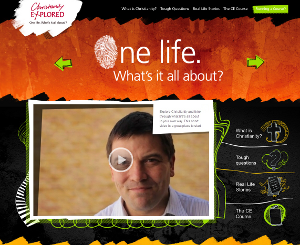
Stephen Hawking has announced that heaven “is a fairy story for people afraid of the dark”. And, because he’s a scientist, he’s allowed to make unscientific statements of belief and present them as virtual fact.
What’s worth doing is to pick out the unscientific assumptions in any statement a scientist makes when they talk about faith (whether they’re pro-faith or not).
Here’s what Professor Hawking said in his interview, complete with an “assumption alarm”:
“I regard the brain as a computer… (ASSUMPTION: just because we know a little of how the brain works, doesn’t mean it is merely an organic computer…)
“which will stop working when its components fail. There is no heaven or afterlife for broken down computers… (ASSUMPTION: the unspoken beliefs here are that a human is nothing more than a brain with a body round it, and that a brain cannot be restarted when it “breaks down”…)
"that is a fairy story for people afraid of the dark (ASSUMPTION: just because the thought of heaven is comforting to those who fear death, doesn’t mean it’s not actually true…).
“The universe is governed by science… (ASSUMPTION: science can’t prove that scientific laws are impersonal and happen to be as they are, rather than the way in which a personal Creator has decided to make and run a universe…).
“[Because we happen to be here] we should seek the greatest value of our action… (ASSUMPTION: this assumes that we know what all the consequences of an action would be, and that we can agree on what the greatest value of an particular action is. This is a moral question, which can’t be answered by scientific endeavour).”
If you’d like to see a useful answer on why science hasn’t disproved Christianity (including the idea of heaven), have a watch of this.

Over a thousand people went to Bible by the Beach on the south coast last weekend.
If you’ve not been (or not heard of it before), it’s a great few days in Eastbourne: top-notch Bible teaching, a great variety of stuff happening, plenty of chance to relax, and of course fantastic singing with a choir of a thousand. And children love the programme that's provided for them (see pic).
It's also very good value-for-money: though unfortunately the budget doesn't stretch to warming up the English Channel for swimming…
May Bank Holiday 2012: Bible. Beach. Brilliant.

Dear Friends,
I'm thrilled to announce the launch of a new website designed specifically for anyone investigating the Christian faith. After many months of hard work by the CE team and our friends at The Good Book Company, the all-new www.christianityexplored.org is now up and running.
The idea is for this site to be a welcoming, unpressured and jargon-free place for people to explore the Christian faith. It is packed with answers to tough questions as well as some wonderfully engaging real-life stories of people who have come to faith in Christ Jesus. There is an animated presentation of the gospel and some info on the Christianity Explored course as well as a powerful 'find a course' feature so that we can point people to churches local to them which are running a CE course.
I'd be be delighted if you'd have a look at the site and if you like it, forward the link on to others who you think may be interested. Why not link to it from your church website or post it on your Facebook page? The beauty is that it is suitable for anyone and everyone to visit, regardless of how they would describe themselves spiritually.
And of course if you run Christianity Explored, please make sure that your church is registered on our database so that we can point visitors to you. You can register your course here on our new site for leaders - www.ceministries.org.
As with all of the resources we and The Good Book Company produce together, we are praying that these will be useful to you as you share the great news of the gospel with those around you.
Yours in Christ,
Rico Tice
Conversation about assisted suicide, dying with dignity and euthanasia is likely to hot up this summer, as BBC2 prepares to air a new series on the subject.
How can we, as Christians, speak to our friends, family and colleagues about euthanasia without seeming heartless and unfeeling? Here are 7 tips to speaking positively about these senstitive issues.... continue reading
The latest "news" about Christianity from the BBC has got us thinking about the types of Christianity-based stories that do, and don't, make it into the headlines.
The Beeb's latest piece, on a book which claims the timings of Easter week in the Gospels don't fit together, fits into the first of our three "this gets into the mainstream media" categories:
And here are the three headlines you won’t see quite as often!:
If you’re interested in looking at how the different events of Easter week as recounted by the four Gospel writers actually fit together, this timeline is great.
There’s a new “Bible”… for atheists. Which, it strikes me, is a contradiction in terms.
Humanist philosopher AC Grayling has written “The Good Book” as a blend of Greek philosophy, Confucian sages and the discoveries of modern science.... continue reading

Please note that this was an April Fools joke. At The Good Book Company, our aim is to produce materials that help Christians to read the Bible for themselves so that they might grow in the knowledge and love of the Lord Jesus Christ. In other words, the very opposite of the approach suggested by the Pre-thumbed Bible.
Although we know that many enjoyed the joke, we are sorry for any offense that was caused to those who are unfamiliar with our resources and underlying principles.
We've not been as excited about a new product for a long time: it's a resource we think many Christians have been waiting for.
If you've ever sat in a Bible study, surrounded by other Christians whose Bibles are more well-worn than yours, and felt embarrassed that yours doesn't have the tattiness, underlined passages and used feel that give an appearance of godliness: you need to get one of our new range of pre-thumbed Bibles.
Each page has been turned for you at least 15 times (40 for the book of Romans): and key passages have been underlined and/or highlighted throughout.
You need never worry about having not read much of the Scriptures again!
The Good Book Company: reading the Bible so you don't have to.
And, just for today, you can save a whopping 43%—just click here.
A major topic of conversation in our office today, like in most offices up and down the country and round the world, has been what’s happened in Japan.
How do we respond to such horrendous suffering? How do Christians begin to trust a good God in the face of such facts?
In some ways, now is not the time for anything other than sorrow. giving what we can, and, in a Christian’s case, prayer. But still, some people demand answers from us: here, for what it’s worth, is what we think we might try to say.
Some other helpful and interesting resources:

A church in Wiltshire has discoverd that an extremely rare first edition King James Bible had been sitting on a shelf gathering dust for the last 150 years.
The BBC reported that it is one of fewer than 200 original printings of the KJV known to exist.
Church council member Geoff Proctor told the BBC that the most important thing about the discovery was that it was meant to be a living working book for people to live by.
"Well I think what it's going to do is enable us to talk about the Bible," he said.
"Because in a secular world it's seen as an important document, it will actually bring the opportunities to us to go and discuss it in more detail.
"When we took it for evaluation to the curator of a museum, one of the first things he said was whatever you do you must display this so that people can read the word.
"That stuck with me—the fact that it's what it says rather than what it is," he said.
It struck me how this story is repeated in millions of households in the UK and beyond. It's surprising how many houses you go in have a Bible on a shelf somewhere. But it's not a lucky charm, and it's no use if it's not read.
And I'm not talking about non-Christian homes…

That's one of the messages of a new BBC Two series, "The Bible's buried secrets". It's presented by a new TV presence, Dr Francesca Stavrakopoulou, who's a lecturer at Exeter University, and has been talked about in the media today.
Obviously, millions will watch this when it's aired, and we'll blog a Bible-centred response to its precise claims as and when they're made. But just to pick up on what's been in the news today:
The God of the Bible, Yahweh, had a wife, Asherah, who was part of a "divine pair" with him.
How strange that the Bible doesn’t mention this! If Yahweh and Asherah were a couple, they clearly really didn't get on, since Yahweh told his people to cut down their Asherah poles which they gathered around to praise this alternative "god" (see for instance Judges 6 v 25), and He was "provoked to anger" when His people worshipped Asherah (1 Kings 14 v 15).
God's people were called to worship, love and serve only Him (Exodus 20 v 3). Why? Because He is the true God, the real God, the only God who can deliver on His promises (Psalm 115 v 1-11).
"Eve has been very unfairly maligned as the troublesome wife who brought about the Fall."
If this is historical, it's not unfair: it's fact. And of course Adam certainly doesn't get away with it either: God holds him to account for his failure to man up and warn his wife off listening to the serpent. The Bible doesn't present one as any more or less guilty than the other: both rebel against God. Both receive curses because of it. This view has more to do with medieval Catholic teaching than what the Bible actually says.
"As an academic, I think you leave faith at the door… I don't think you can use the Bible as a reliable historical source."
The second half of that statement is a statement of opinion. Dr Stavrakopoulou is of the belief that the Bible is not historical. But that in itself is a faith position. It means that when she reads the Bible she has already decided the events didn't really happen in history—that's a belief, just as much as deciding the events did happen in history. It's a fact that needs to be pointed out as often as possible by Christians: everyone has faith, and you can't leave it at the door when you read the Bible.
One more quick thing: the comments under The Telegraph article on this are mainly angry that an atheist is able to talk about the Bible on TV. Actually, I'm not sure that's a problem in and of itself, if:
Hopefully the series will include those three things!